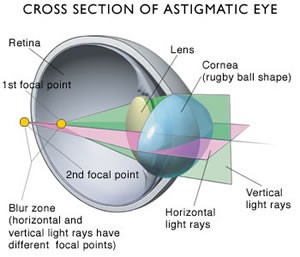- Glasses (Refractive error / Laser)
There are 4 common conditions that people require glasses for:
- Long-sightedness – This is when distance objects are in focus more clearly than near.
- Short-sightedness – This is when near objects are in focus more than distance.
- Astigmatism – This is when the eye is shaped more like a rugby ball than a football, i.e. glasses are required that correct the sight differently depending on the angle of astigmatism.
- Presbyopia – This is the age-related need for reading glasses.


To correct these refractive errors most people can manage with glasses, contact lenses, or both. This dependency on glasses does not suit everyone. Most people are aware of ‘laser eye surgery’ to correct for glasses. These procedures are now quick, safe, and available on the high street. They are variably known as LASIK, LASEK, or PRK. So, what are the options, and what is right for you?
If you are aged between 18 and 45, and have short sightedness, mild astigmatism or mild long sightedness, then laser refractive surgery is the best option. This will mean you are free from glasses for both near and distance until your mid forties.
If you are aged over 45 or require reading glasses, then the best option is to have a clear lens extraction. This is removal of the eyes natural lens, which is out of focus, and replacement with an artificial lens, to correct the focus. This operation is virtually identical to a cataract extraction. Cataract extractions are the commonest operation in the country. They are safe and very effective and can correct all refractive errors, extreme myopia, hyperopia, astigmatism, and even presbyopia.
Cataracts, just like other aging changes, are a normal and natural part of aging. Everybody will develop a cataract if they live long enough. The age at which cataracts develop is variable. Once a cataract has formed, the only way to improve the vision is with a cataract operation. This is where the old cloudy lens is removed and a new clear acrylic lens is implanted. Without surgery the vision will deteriorate until you cannot perform day to day tasks.
If you have a clear lens extraction to correct refractive error, then you will never need cataract surgery in the future. Thus, you are bringing an operation that you will have to have in future, forward in time. In contrast, if you have laser surgery to correct refractive laser, then in the future you will still need to have cataract surgery. i.e. you will require 2 procedures instead on one. This is one of the advantages of clear lens extraction over refractive laser.
There are 2 types of lenses that can be implanted during clear lens extraction or cataract extraction; a lens focused for distance (monofocal lens), or a lens that can be used to focus for both near and distance (presbyopic or multifocal lens).
The monofocal distance lens will give you the best quality image with good contrast and sharpness, but will require you to wear reading or intermediate glasses for close work. This is the most common type of implant. It is the only implant available on the NHS. A multifocal lens will give you good distance and close vision, but the compromise for this increased range of vision is some loss of sharpness and contrast, with occasional ghosting or glare. For this reason people talk of multifocal lenses requiring a period of neural adaptation, whereby your brain gets used to these nuances, until your vision is accepted as “normal” for you. This may take some months. 1 in 100 people never adapt to these lenses and the lenses have to be removed and replaced with monofocal lenses.
The type of lens implant that you should choose depends on your visual requirements and expectations from surgery. You should discuss this with your ophthalmologist.

